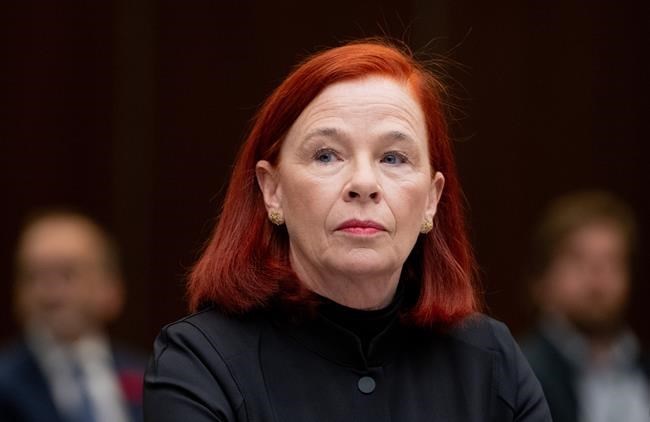OTTAWA — The president and CEO of CBC/Radio-Canada defended the public broadcaster and its independence Thursday from a fresh barrage of pointed Conservative questions about its coverage of the Israel-Hamas conflict.
In her opening remarks, Catherine Tait told MPs on the heritage committee that the CBC is accountable to all Canadians and not to politicians, and that its journalists work independently of corporate management.
She also made a point of noting that the Crown corporation's mandate is set out in the Broadcasting Act, which stipulates that CBC has journalistic and creative independence.
"That independence is essential to our existence," Tait said. "It marks the fundamental difference between a public broadcaster that serves citizens and a state broadcaster that serves the government."
Conservative MPs, however, wanted to hear more about CBC's position on whether to call Hamas militants "terrorists." Conservative deputy leader Melissa Lantsman tried last month to summon the head of CBC and its director of journalistic standards to testify about that, but Bloc Quebecois, Liberal and NDP members argued against it.
The CBC has said it uses the words "terrorist" or "terrorism" when they are attributed to someone, but it is asking reporters to otherwise avoid the terms because they are loaded with political and emotional overtones.
The Canadian Press, The Associated Press, the BBC and other news organizations follow similar practices.
"Frankly, I'm disturbed" that some members of the committee wanted to insert themselves into the CBC's editorial decisions, said Tait, adding that she is not directly involved in the work of its newsrooms.
"The journalism is entirely independent ... we do not interfere or direct or try to influence the news," she said of herself and fellow executives.
She encouraged members of Parliament who have concerns with CBC's news coverage to write to its independent ombudsman.
Liberal MPs asked what would happen if the public broadcaster's $1.4-billion budget was reduced or cut entirely.
Conservative Leader Pierre Poilievre has promised to pare down the budget for CBC's English services while retaining coverage for linguistic minorities.
Tait said defunding the CBC would be devastating to its ability to meet its mandate to serve all Canadians, and rural communities in particular. She also said losing the public broadcaster would be bad for Canadian democracy.
"We already have, in English Canada, 33 communities with populations of over 50,000 that have no CBC presence," she said.
Conservative MP Rachael Thomas asked if the CBC could provide Canadians with news if it were "set free from the shackles of government." Tait said it would be extremely difficult to continue to operate in smaller communities.
"I'm curious as to how the CBC can then claim to be independent if they can't survive without government dollars," Thomas said.
This report by The Canadian Press was first published Nov. 2, 2023.
Sarah Ritchie, The Canadian Press




